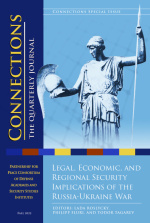At the threshold of its third year, Russia's large-scale and brutal war against Ukraine continues to kill thousands, terrorize millions of Ukrainians, and disrupt international supply chains, affecting global energy and food markets. This is the second journal issue dedicated to the ongoing war. It dwells on the issue of lustration - a problem Ukraine did not effectively address during its post-communist transition, which in turn led to the perpetuation of the Kremlin's ideology and, thus, its continuous influence on Ukrainian politics and society. Two articles explore the rationale for including Russia in the U.S. Department of State's list of state sponsors of terrorism. While some European countries and the European Parliament have already declared Russia a terrorist state, the debate in the United States is influenced by numerous additional considerations, and the decision is still pending. The link between military expenditures, defense industrial investments, and the general economic development and stability in wartime is also examined in detail. The final two articles analyze Moscow's interests and strategy towards the post-Soviet states and the strategically important Black Sea region.
Editorial
Legal, Economic, and Regional Security Implications of the Russia-Ukraine War
Article statistics
Bibliography
Dennis G. Barten, Derrick Tin, Fredrik Granholm, Diana Rusnak, Frits van Osch, and Gregory Ciottone, “Attacks on Ukrainian Healthcare Facilities during the First Year of the Full-scale Russian Invasion of Ukraine,” Conflict and Health 17, no. 1 (2023), 57, https://doi.org/10.1186/s13031-023-00557-2.
Viktor Vyshnevskyi, Serhii Shevchuk, Viktor Komorin, Yurii Oleynik, and Peter Gleick, “The Destruction of the Kakhovka Dam and Its Consequences,” Water International 48, no. 5 (2023): 631-647, https://doi.org/10.1080/02508060.2023.2247679.
Soojung Ahn, Dongin Kim, and Sandro Steinbach, “The Impact of the Russian Invasion of Ukraine on Grain and Oilseed Trade,” Agribusiness 39, no. 1 (2023): 291-299, https://doi.org/10.1002/agr.21794.
Qi Zhang, Kun Yang, Yi Hu, Jianbin Jiao, and Shouyang Wang, “Unveiling the Impact of Geopolitical Conflict on Oil Prices: A Case Study of the Russia-Ukraine War and its Channels,” Energy Economics 126 (2023), 106956, https://doi.org/10.1016/j.eneco. 2023.106956.
Shengming Chen, Ahmed Bouteska, Taimur Sharif, and `Mohammad Zoynul Abedin, “The Russia–Ukraine War and Energy Market Volatility: A Novel Application of the Volatility Ratio in the Context of Natural Gas,” Resources Policy 85 (2023), 103792, https://doi.org/10.1016/j.resourpol.2023.103792.
Marta Marson and Donatella Saccone, “Fed with Import and Starved by War: Estimating the Consequences of the Russia-Ukraine Conflict on Cereals Trade and Global Hunger,” International Economics and Economic Policy 20, no. 3 (2023): 413–442, https://doi.org/10.1007/s10368-023-00564-x.
Olena Polivanova, Kateryna Nykolyna, Kyrylo Stepanenko, Serhii Myroslavskyi, and Alla Puktetska, “Polyakh and Others v. Ukraine: The Latest Standards of Applicability of Article 8 of the European Convention of Human Rights in Lustration Cases,” Connections: The Quarterly Journal 21, no. 4 (Fall 2022): 11-27, https://doi.org/10.11610/Connections.21.4.42.
Daniel Byman, “How to Think About State Sponsorship of Terrorism,” Survival: Global Politics and Strategy 65, no. 4 (2023): 101-121, https://doi.org/10.1080/00396338.2023.2239060.
Olena Davlikanova, “Declaration of the Russian State as a State Sponsor of Terrorism: Pros, Cons, and Realities,” Connections: The Quarterly Journal 21, no. 4 (Fall 2022): 47-66, https://doi.org/10.11610/Connections.21.4.40.

